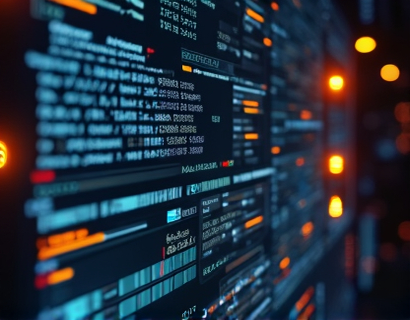The Synergy of AI and Crypto: Revolutionizing Digital Finance
The intersection of artificial intelligence and cryptocurrency is giving birth to a new era in digital finance, one that promises unparalleled efficiency, security, and innovation. This transformative synergy is not just a buzzword but a tangible shift in how financial services are delivered and experienced. As we delve into this topic, we will explore the various ways AI is enhancing the crypto landscape, from smart contracts to predictive analytics, and how these advancements are reshaping the future of finance.
Understanding the Basics: AI and Cryptocurrency
To fully appreciate the impact of AI on cryptocurrency, it's essential to understand the fundamental concepts of both technologies. Artificial intelligence, at its core, involves the simulation of human intelligence processes by machines, particularly computer systems. These processes include learning, reasoning, and self-correction. On the other hand, cryptocurrency is a digital or virtual currency that uses cryptography for security and operates on a decentralized network, typically a blockchain.
The combination of these two technologies creates a powerful toolset for the financial industry. AI's ability to process and analyze vast amounts of data quickly and accurately complements cryptocurrency's decentralized and secure nature. This synergy is leading to the development of intelligent crypto solutions that are more efficient, secure, and user-friendly.
Smart Contracts: Automating Agreements
One of the most significant applications of AI in cryptocurrency is in the realm of smart contracts. Smart contracts are self-executing contracts with the terms of the agreement directly written into code. AI enhances smart contracts by enabling more complex and dynamic conditions to be programmed and executed automatically.
For instance, AI can analyze market conditions in real-time and trigger smart contracts to execute trades or transfer assets based on predefined criteria. This automation reduces the need for intermediaries, lowers transaction costs, and increases the speed and reliability of contract execution. The integration of AI in smart contracts also enhances security by detecting and mitigating potential risks and vulnerabilities.
Predictive Analytics: Forecasting Market Trends
Predictive analytics is another area where AI is making a substantial impact in the crypto space. Traditional financial markets rely heavily on historical data and expert analysis to forecast trends. However, the volatility and complexity of cryptocurrency markets make this approach less effective. AI algorithms can process vast amounts of data from various sources, including social media, news feeds, and transaction patterns, to identify patterns and predict future movements.
These predictive models can help investors make more informed decisions, optimize portfolios, and manage risks more effectively. AI-driven trading bots can execute trades based on these predictions, providing a competitive edge in the fast-paced crypto market. The ability to anticipate market trends with higher accuracy is a game-changer for both individual investors and institutional players.
Enhanced Security: Protecting Digital Assets
Security is a paramount concern in the cryptocurrency ecosystem. AI technologies are being leveraged to enhance the security of digital assets and protect against fraud and cyber threats. Machine learning algorithms can detect unusual patterns and anomalies in transaction data, flagging potential security breaches in real-time.
Additionally, AI can improve the authentication and verification processes for crypto transactions. Biometric authentication, powered by AI, offers a more secure and convenient way to access and manage digital assets. This not only enhances user experience but also significantly reduces the risk of unauthorized access and fraud.
Decentralized Finance (DeFi): AI-Driven Innovations
Decentralized Finance, or DeFi, is an emerging sector that aims to recreate traditional financial services on blockchain platforms. AI is playing a crucial role in the development and optimization of DeFi applications. For example, AI can enhance lending and borrowing platforms by assessing creditworthiness more accurately and dynamically adjusting interest rates based on market conditions.
AI-driven risk management tools can also help DeFi protocols manage liquidity and mitigate systemic risks. These tools analyze real-time data to provide insights into market liquidity, helping platforms maintain stability and ensure smooth operations. The integration of AI in DeFi is paving the way for more accessible, efficient, and secure financial services.
User Experience: Personalized Financial Services
The combination of AI and cryptocurrency is not only transforming backend processes but also enhancing the user experience. AI-powered chatbots and virtual assistants can provide 24/7 customer support, answering queries and guiding users through complex financial operations. These AI-driven interfaces are designed to be intuitive and user-friendly, making cryptocurrency more accessible to a broader audience.
Personalization is another key area where AI shines. By analyzing user behavior and preferences, AI can offer tailored financial recommendations and services. For instance, AI can suggest investment strategies based on an individual's risk tolerance and financial goals, or recommend crypto assets that align with their portfolio composition. This level of personalization enhances user satisfaction and fosters greater engagement with crypto platforms.
Challenges and Considerations
While the integration of AI and cryptocurrency offers numerous benefits, it also presents several challenges that need to be addressed. One of the primary concerns is the regulatory landscape. The decentralized and borderless nature of cryptocurrency, combined with the complex algorithms of AI, poses unique regulatory challenges. Ensuring compliance with existing laws while fostering innovation is a delicate balance that regulators and industry players must navigate.
Another challenge is the technical complexity involved in integrating AI with blockchain technology. Developing robust and scalable solutions requires significant expertise and resources. Additionally, there are concerns about the environmental impact of AI and cryptocurrency, particularly the energy consumption associated with blockchain mining and AI training processes. Addressing these sustainability issues is crucial for the long-term viability of these technologies.
Future Prospects: The Road Ahead
Looking ahead, the synergy between AI and cryptocurrency is poised to drive further innovation and transformation in the financial sector. As AI algorithms become more advanced, we can expect even more sophisticated applications in areas such as cross-border payments, identity verification, and financial inclusion.
The potential for AI to democratize access to financial services is immense. In regions with underdeveloped financial infrastructure, AI-powered crypto solutions can provide essential financial tools and services to underserved populations. This can lead to greater economic empowerment and inclusivity on a global scale.
Moreover, the ongoing development of more efficient consensus mechanisms and the adoption of layer 2 solutions will help mitigate some of the scalability and energy consumption issues. As the technology matures, the integration of AI and cryptocurrency will become more seamless, leading to a more robust and user-friendly financial ecosystem.
Conclusion
The convergence of AI and cryptocurrency is revolutionizing digital finance, offering a range of benefits from enhanced security and efficiency to personalized user experiences and broader financial inclusion. While challenges remain, the potential for positive impact is significant. As the technology continues to evolve, it will be fascinating to witness how these intelligent solutions shape the future of finance, creating new opportunities and redefining traditional paradigms.










































